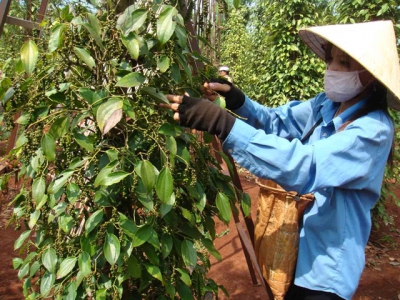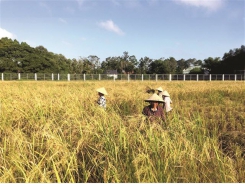As pepper prices fall, experts urge farmers to go organic, join co-operatives

BÀ RỊA -VŨNG TÀU — Pepper farmers in south-eastern provinces are being encouraged to switch to organic farming and join co-operative groups as more and more are struggling to earn a livelihood from the spice.
A farmer takes care of pepper plants. Experts want pepper farmers to work with co-operative groups and switch to organic farming to escape the worst effects of plummeting prices.. — Photo baobinhduong
Phạm Văn Hải of Châu Đức District in Bà Rìa-Vũng Tàu Province said until five years ago his family’s two-odd hectares of pepper farm fetched hundreds of millions of đồng every season.
But due to falling prices in recent years he has had to cut his farm to a third of its original size.
This year workers are especially hard to find since many have left for cities to work after Tết (Lunar New Year) holiday. This leads to higher costs for farmers as wages rise.
Quảng Thành Commune used to have the largest area under pepper in Châu Đức District at 890ha, but is now down to around 500ha as farmers have been switching to more profitable crops.
Bà Rịa-Vũng Tàu has around 11,000ha under pepper, but the output has fallen by more than half this year.
Cẩm Mỹ District in Đồng Nai Province, an important pepper growing area with nearly 7,000ha under the spice, is also seeing many farmers switch to other crops.
Trương Đình Bá, chairman of the province’s Lâm San Commune Farmers Association, said pepper farmers are hesitant due to falling prices and those still growing are losing VNĐ30,000 (US$1.29) per kilogramme.
Recently prices have been recovering, but according to Nguyễn Nam Hải, chairman of the Việt Nam Pepper Association, demand remains modest and global prices have only increased slightly. The spike in domestic prices could be due to businesses speculating in the spice since output is down this year, he said.
Despite the difficulties, many farmers want to keep growing pepper, and have been changing their farming methods, focusing on organic rather than solely output, he said.
They are also working with the Lâm San Co-operative to export their output, and so farmers in Lâm San commune are not impacted heavily by the pandemic. Their entire output is bought by the co-operative at higher than market prices.
Bá said the province should expand this model.
Võ Văn Phi, deputy chairman of the Đồng Nai Province People’s Committee, said the province has around 12,000ha under pepper, one of its key crops.
It would help the farmers by building supply chains for exports that meet VietGap standards and helping them overcome challenges and work towards sustainable farming, he added.
Lâm Ngọc Nhâm, director of the Bầu Mây Agriculutre - Commerce - Tourism JSC, said processing increases the value of pepper by more than 250 times.
Exports of the spice in the first two months of the year fell to 32,000 tonnes worth $93 million, a decrease of 0.9 per cent year-on-year.
Có thể bạn quan tâm
Phần mềm

Phối trộn thức ăn chăn nuôi

Pha dung dịch thủy canh

Định mức cho tôm ăn

Phối trộn phân bón NPK

Xác định tỷ lệ tôm sống

Chuyển đổi đơn vị phân bón

Xác định công suất sục khí

Chuyển đổi đơn vị tôm

Tính diện tích nhà kính

Tính thể tích ao hồ



 Bangladesh to import 50,000 tons of rice from…
Bangladesh to import 50,000 tons of rice from…  Seasonal organic rice revival in Mekong Delta
Seasonal organic rice revival in Mekong Delta